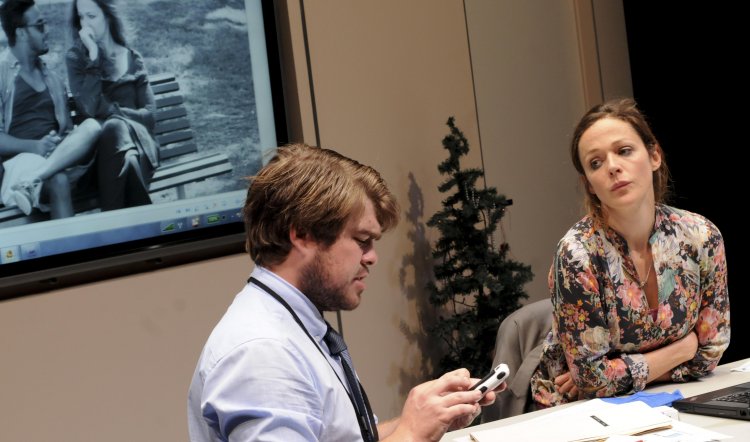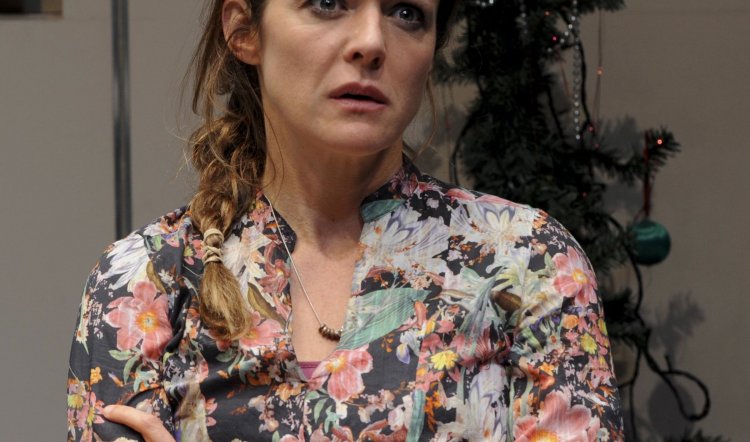
LIBERTY EQUALITY FRATERNITY
LIBERTY EQUALITY FRATERNITY, Ensemble Theatre, 7 February-9 March 2013. Photos by Heidrun Lohr; main: Andrew Ryan and Caroline Brazier; right: Caroline Brazier.
Geoffrey Atherden is a writer in whose drama lurks comedy, and vice versa, and both are always infused with dark elements. They simmer just beneath the surface and break out like toxic bubbles of nasty reality when least expected. Think of his TV successes - the fabled Mother and Son and the seven AFI-winning Grass Roots - both could elicit gasps of horror as well as gales of laughter. Much the same happens with Liberty Equality Fraternity.
The play pokes a comic finger at the Facebook generation while slipping under the radar with an unsettling drama of the 21st century's overarching culture of surveillance. Writing in Crikey.com today (15 February) Bernard Keane's essay Gender, sexuality and cybersecurity: an online tale is spookily relevant to what Atherden and director Shannon Murphy are doing in the unlikely but appropriate surroundings of the little theatre in Kirribilli. There, hidden in plain sight in this deceptive play is a sharp commentary on women in society: always under scrutiny, forever the subject of the male gaze and - according to Keane's research - statistically more likely to be watched by the male dominated security industry and its CCTV. Even more disconcerting, women are more likely to use Facebook and to be watched on Facebook.
And it's Facebook and CCTV that bring Orlagh O'Connor (Caroline Brazier) into conflict with a mysterious government instrumentality when she's detained (voluntarily!) for questioning about presumed terrorist links. Orlagh is a suburban wife and mother-of-two whose main concern, at first, is simply that the questions be over in time to pick up the kids from school. However, she hasn't reckoned on being detained by box-ticking bureaucrat "Arky" (Andrew Ryan). His obtuse stupidity at first reduces Orlagh (and the audience) to helpless giggles but soon becomes Kafka's worst - if grimly hilarious - nightmare.
Orlagh's ordeal, and despite the laughter it is an ordeal, begins before the play starts. As the audience files in a large screen on the back wall of an otherwise featureless, windowless room (one table, two chairs, a laptop) is showing, CCTV-spy camera-style, the young woman in this very room. Some notice, some don't, some watch, some gasbag, some unwrap their lollies, but mostly thus then unknown woman is left to her own devices. And like anyone who's ever been marooned while waiting for something or someone, she does all the things we all do including fidget and get cranky and finally, nervous. And then she appears on stage - in the same room - and continues her irritable bewilderment.
When "Arky" finally appears, wheeling a trolley-load of files enough to see a Supreme Court barrister through a lengthy trial, the relief is short-lived. She (and we) have been forced to listen to the most execrable muzak and when he asks her if she liked the music - found it soothing and relaxing, as intended - it's obvious something is awry. And he knows everything about her - displaying the information on the screen - except an apparently vital detail of the hour of her birth. When, in exasperation, she makes it up he instantly takes it as further evidence of calumny.

Liberty Equality Fraternity is both realistic and farcical, funny and alarming. At some point during her inane interrogation Orlagh is suddenly struck by a brainwave: she's actually dead and this is some kind of test before she's consigned to wherever she's going. It makes as much sense as anything else, but no - she's not dead, this is really happening and Arky is as officious and silly as she fears.
What finally happens when an elegant older man appears (Helmut Bakaitas) who might be a butler or might be the boss has to be experienced and savoured for the insanity and logic that Geoffrey Atherden manages to conjure up. Shannon Murphy and Caroline Brazier treat the text with utmost seriousness. There isn't a hint of comedy or farce in the playing of it and that means it's both hysterically funny and hysterically scary by turns.
Brazier - an actress whose entire being and intelligence are given over to a character - is beautifully partnered by Andrew Ryan in their non-stop wrangle and interplay with the interactive screen and its apparent revelations. Neither fall prey to the easy temptations to over-play or play up to the sharp lines and jokes the playwright so generously supplies. The discipline of the performances is impeccable and the end result is, therefore, splendid. And the creative team lends great support too: set designer Michael Hankin, lighting designer Verity Hampson and sound/AV designer Stephen Toulmin.
You'll be amazed and highly amused by the play, puzzled by the Christmas tree, delighted by the performances and yet afterwards you might find yourself looking about for those unblinking little cameras and wondering about the next thing you say or post…especially if you're a woman!



